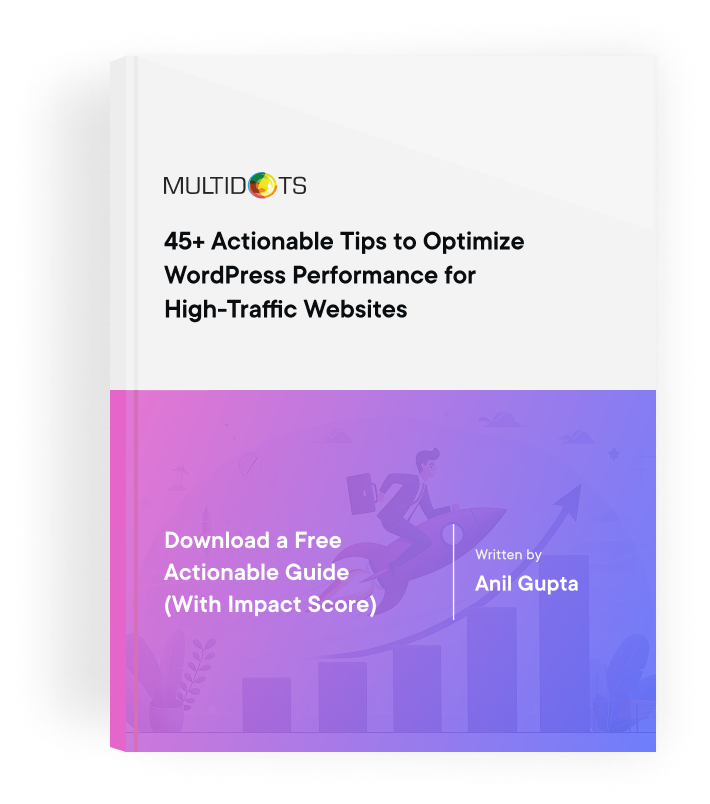Drupal 7 is Ending—Here’s Why You Should Switch to WordPress not Drupal 10
Find out why upgrading from Drupal 7 to Drupal 10 might not be a smart choice
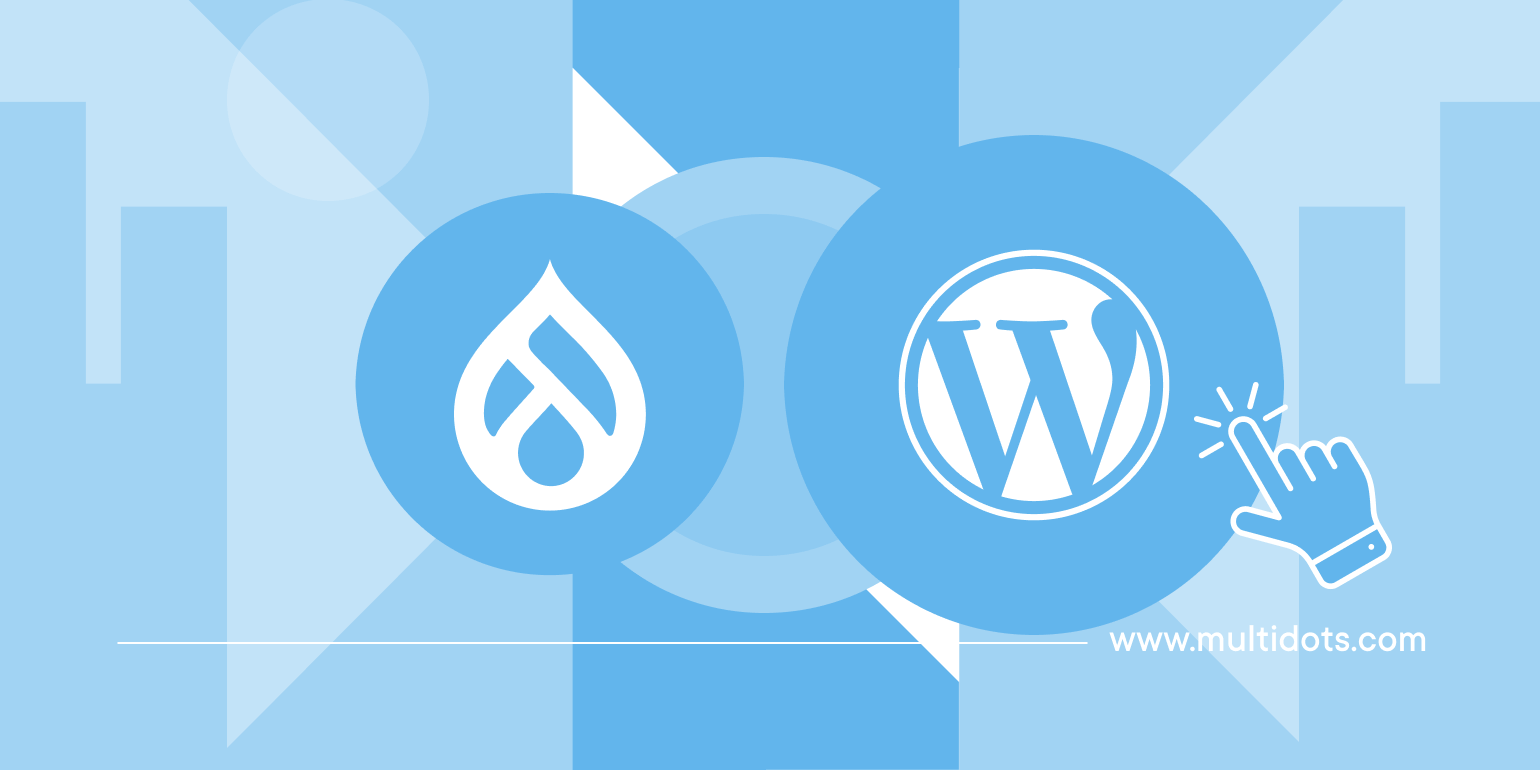
Table of Contents
Drupal 7 will reach its end of life (EOL) on January 5, 2025, requiring businesses and enterprises that rely on it to upgrade their content management system (CMS). This is a crucial step in keeping the website and the data secured.
While Drupal 10 may seem like a logical choice, it may not be the best option for organizations looking to future-proof their online presence.
Moreover, in the interim, this does bring an opportunity for business leaders to evaluate other options, especially WordPress. WordPress is the world’s most popular CMS and for good reason — it is user-friendly, has great support, offers immense flexibility, and is safe.
In this article, let’s look at five reasons why you should consider WordPress over Drupal 10 to make the most of this opportunity.
1. Ease of use
Despite being a free and open-source CMS, WordPress cuts no corners when it comes to delivering an intuitive user experience. Even individuals without any blogging experience and technical knowledge can start their website without any headaches.
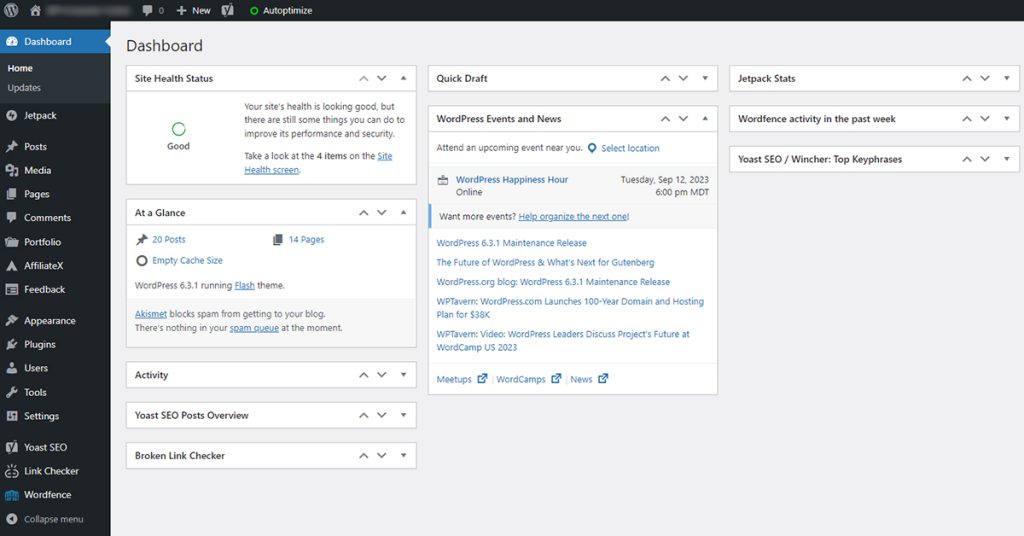
WordPress Backend Dashboard (source)
This makes it easier for you and your team to create and manage content on your platform. The backend of WordPress makes it pretty straightforward to find the right features and access them.
In contrast, Drupal 10, although comes with a few improvements like the updated Claro theme, still requires a deep understanding of the platform. Additionally, advanced functionalities like customizing the appearance and adding external plugins remain developer-dependent.
Many businesses have already migrated from Drupal to WordPress with the help of experienced agencies to reap benefits like faster employee onboarding, better user experience for content teams, and easier collaboration with external stakeholders.
Even if you encounter an issue and can’t find the right technical documentation, you can rely on the large global WordPress communities and forums. Drupal does have an online community, but it’s quite smaller compared to WordPress, primarily due to the latter’s massive user base.
2. Flexibility and customization
As the digital marketplace evolves, businesses and enterprises also need to mold their websites accordingly to address the growing needs of their audience. This may involve installing new plugins and connecting third-party apps via integrations.
WordPress users can do that easily by choosing from over 60,000 plugins, 59,000 of which are accessible from the WordPress Plugin Directory. Whether it is bringing AI capabilities to your content editors or streamlining search engine optimization (SEO), you can find a free or affordable plugin for that.
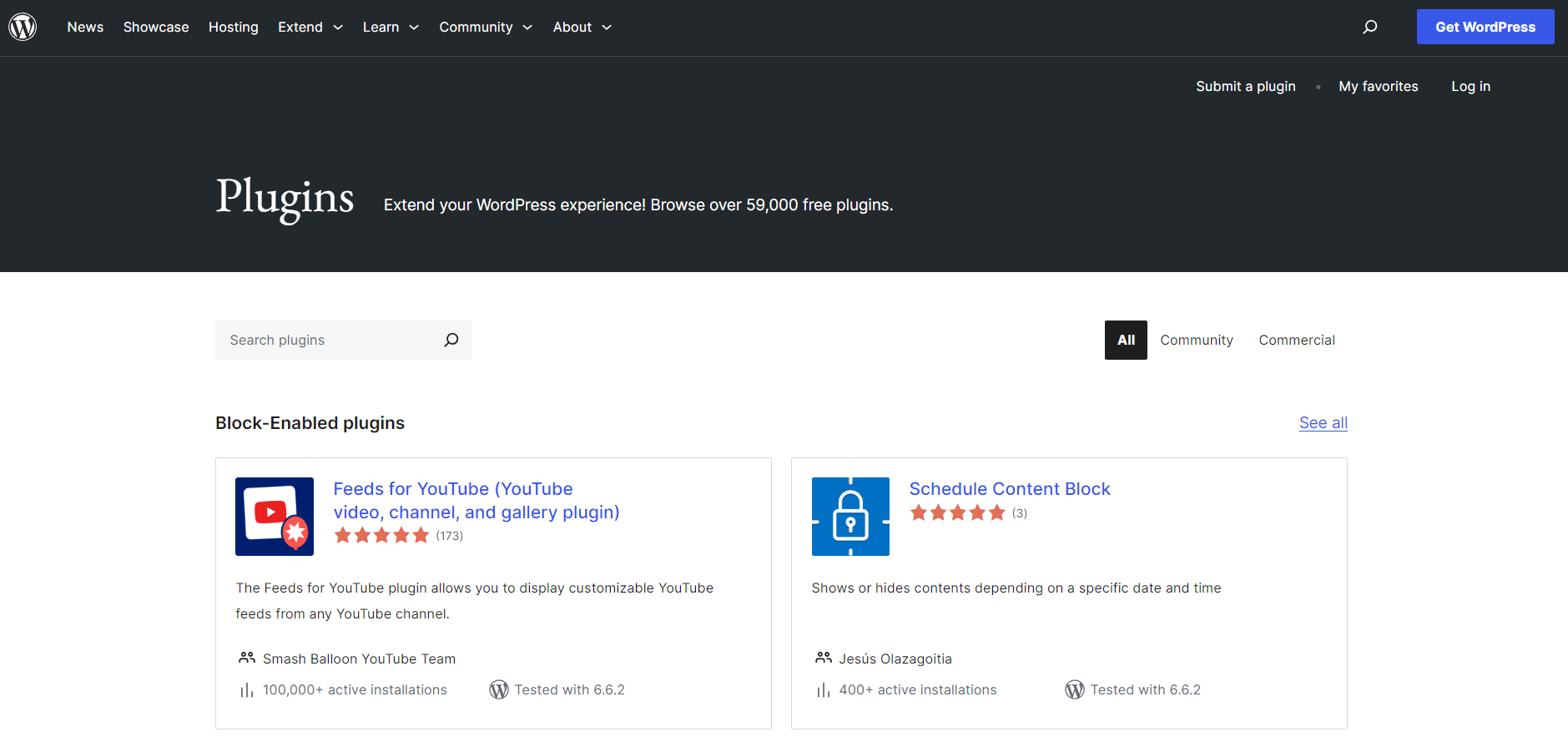
There are over 59,000 WordPress plugins in the official library alone (source)
Moreover, there are also thousands of themes (free and premium) that can be installed on your website within minutes to give your platform a fresh and unique look.
The best part is that you won’t need any kind of coding skills to integrate these solutions into your CMS-related workflows. This makes their adoption fast, helping you remain proactive to market changes while minimizing digital transformation costs.
Although you can still customize your website with Drupal 10, the iota of work is significantly higher. When it comes to making intricate changes, such as adding new functionalities or enhancing the appearance, you are more likely to depend on certified Drupal developers.
3. Ongoing maintenance costs
There are several factors that determine the ongoing maintenance costs for your business or enterprise site. The major ones include security updates, plugin/module updates, hosting, and developer support.
WordPress incurs lower costs compared to Drupal 10 in all these areas. For instance, its core software and plugin updates are automatic (can be done manually as well). There are a lot of affordable WordPress hosting solutions that are more cost-effective than Drupal’s.
Additionally, due to the sheer popularity of WordPress, you can enjoy the privilege of choosing from a larger pool of developers, who on average, charge noticeably less than Drupal 10 developers.
Interestingly, this was also true in the case of Drupal 7. To put it succinctly, none of the versions of Drupal have come close to WordPress.
4. Scalability and performance
You can start with a small WordPress blog today and eventually grow it to a large enterprise site without needing to rebuild your platform from scratch or lose search engine visibility.
WordPress caching solutions, content delivery networks (CDNs), and robust hosting options can handle higher traffic without sacrificing performance.
Drupal 10 is also scalable and can deliver great performance but it requires a bit more technical configuration. This does slow its optimization as your business needs grow, affecting site speed, SEO, and user experience.
Moreover, the workflows around your CMS, like content writing, updating web pages, etc., will get slower. This critical difference between WordPress and Drupal will be frequently experienced by your team which will affect long-term performance.
Similar roadblocks also persist with multisite. WordPress multisite requires fewer maintenance hours to retain its performance with increasing load. At the same time, in the case of Drupal, you may need the assistance of a developer to do relevant fine-tuning to hit identical benchmarks.
5. Security
Businesses and enterprises need to protect their organizational data and customer information from an increasing array of cyber threats. On top of that, they need to remain compliant with the relevant laws and regulations, which also evolve with time.
Both WordPress and Drupal 10 are quite secure for organizations across the board and are regularly maintained by developers to protect you. However, WordPress does edge out Drupal 10 due to its vast ecosystem of security plugins such as Wordfence and Sucuri.
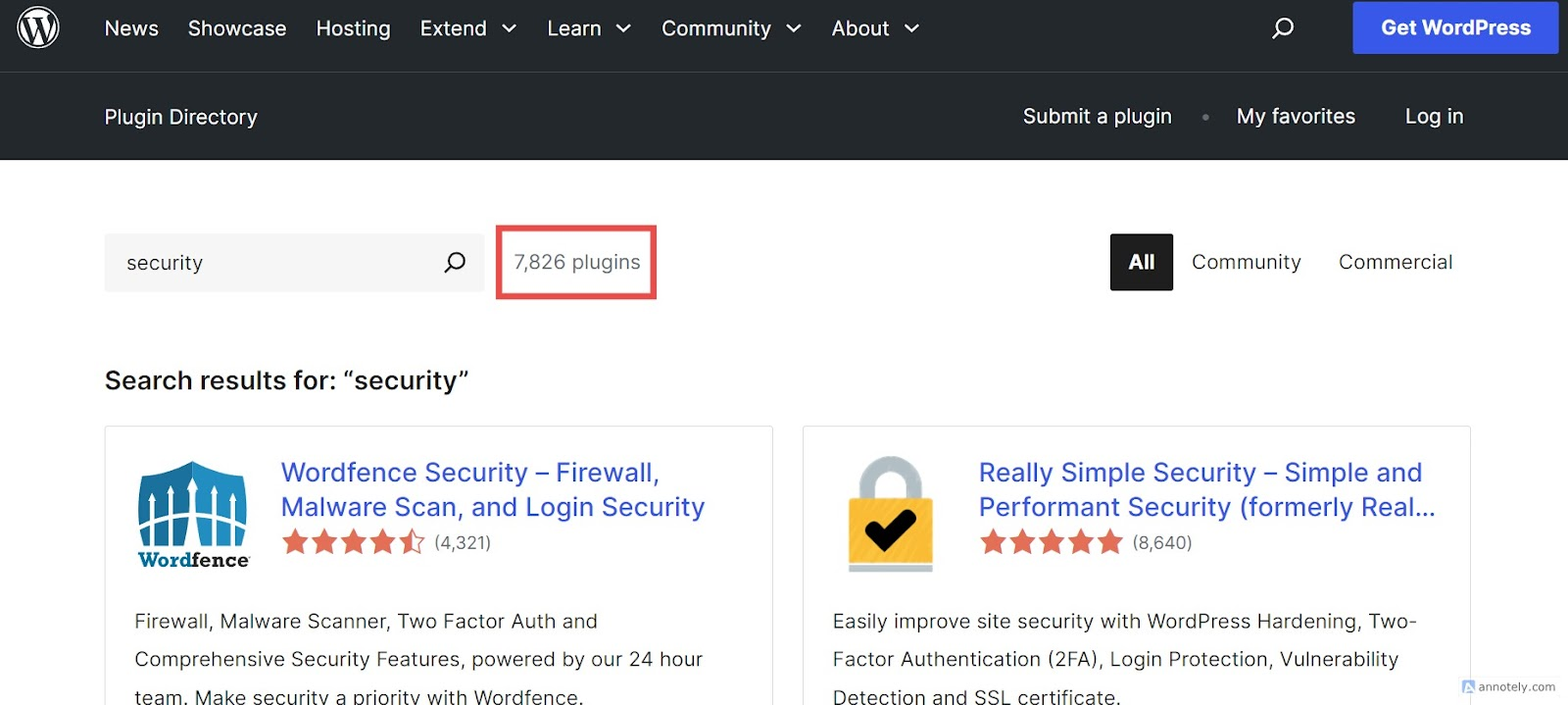
Over 7,500 WordPress security plugins (source)
Adding extra security layers is quite simple with WordPress as anyone can install these plugins with a few clicks. Moreover, the global WordPress communities remain vigilant to emerging digital threats and continue to share tips to secure your online platform.
Even the Drupal to WordPress migration plugins help organizations to securely make the CMS transition.
In a similar condition, the time to action could be longer with Drupal 10, as the community is significantly smaller and any kind of edits require assistance from professional developers.
The WordPress global community, on the other hand, is quite vast and active. As of late 2023, WordPress.org reported over half a million active members around the world.
Future-proof your website by migrating from Drupal to WordPress
Drupal 7 reaching its EOL, brings a great opportunity for organizations across the board to make the switch to a better enterprise-grade CMS that grows with you.
WordPress beats Drupal 10 in ease of use, flexibility, and cost-effectiveness, both in the short and long term. Businesses and enterprises can look forward to better scalability, stronger security, and lower developer costs.
All with an improved user experience.
To make the Drupal to WordPress migration fast and effective, you need a partner that has already a proven track record. Multidots, a WordPress VIP Gold Partner, has helped many businesses make the transition from Drupal to WordPress under tight constraints.
Ready to future-proof your website?
Book a consultation call today and we will get you started.
FAQs
-
Upgrading to Drupal 10 requires technical expertise, with higher complexity and longer development times. Migrating to WordPress offers more ease of use, flexibility, and a broader plugin ecosystem, making it suitable for quicker, cost-effective management.
-
Migration costs vary by site complexity, but WordPress migration is often less expensive due to lower development and maintenance costs compared to Drupal 10’s more demanding infrastructure.
-
Yes, WordPress is secure for enterprises, especially with its vast range of security plugins and regular updates. Proper configuration and using trusted hosting services ensure compliance with security standards.
-
The timeline varies by site complexity, but most migrations take anywhere from a few weeks to a few months, depending on the size of the website and the data involved.
-
No. Drupal 7’s previous EOL was on November 1, 2023, which was later extended to January 5, 2025.
Feel free to schedule a quick call with our migration expert.
Contact Us